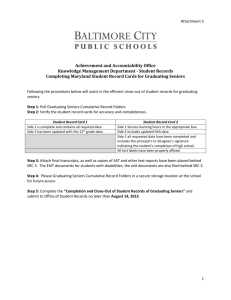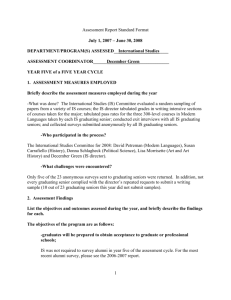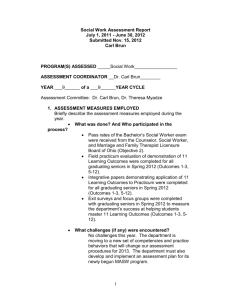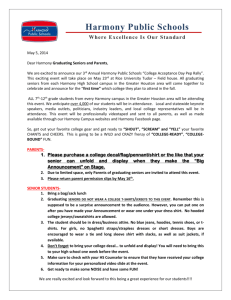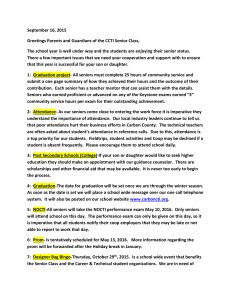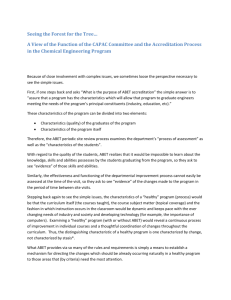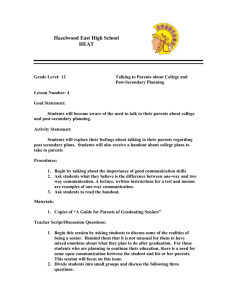Senior Exit Survey - University of Central Missouri
advertisement
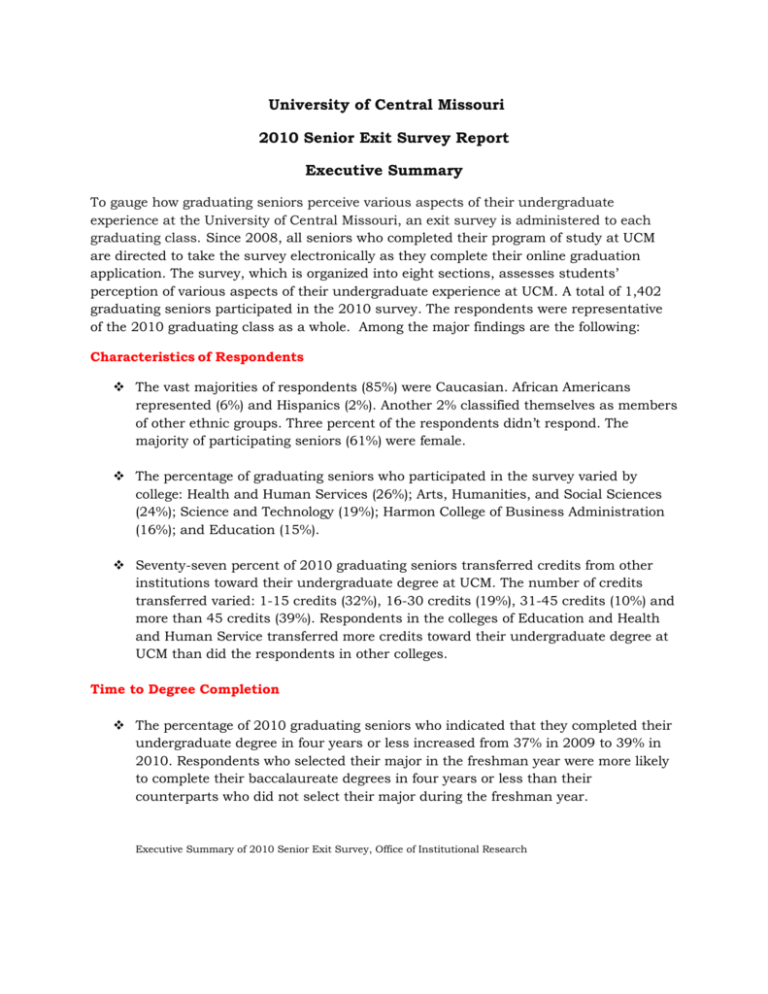
University of Central Missouri 2010 Senior Exit Survey Report Executive Summary To gauge how graduating seniors perceive various aspects of their undergraduate experience at the University of Central Missouri, an exit survey is administered to each graduating class. Since 2008, all seniors who completed their program of study at UCM are directed to take the survey electronically as they complete their online graduation application. The survey, which is organized into eight sections, assesses students’ perception of various aspects of their undergraduate experience at UCM. A total of 1,402 graduating seniors participated in the 2010 survey. The respondents were representative of the 2010 graduating class as a whole. Among the major findings are the following: Characteristics of Respondents The vast majorities of respondents (85%) were Caucasian. African Americans represented (6%) and Hispanics (2%). Another 2% classified themselves as members of other ethnic groups. Three percent of the respondents didn’t respond. The majority of participating seniors (61%) were female. The percentage of graduating seniors who participated in the survey varied by college: Health and Human Services (26%); Arts, Humanities, and Social Sciences (24%); Science and Technology (19%); Harmon College of Business Administration (16%); and Education (15%). Seventy-seven percent of 2010 graduating seniors transferred credits from other institutions toward their undergraduate degree at UCM. The number of credits transferred varied: 1-15 credits (32%), 16-30 credits (19%), 31-45 credits (10%) and more than 45 credits (39%). Respondents in the colleges of Education and Health and Human Service transferred more credits toward their undergraduate degree at UCM than did the respondents in other colleges. Time to Degree Completion The percentage of 2010 graduating seniors who indicated that they completed their undergraduate degree in four years or less increased from 37% in 2009 to 39% in 2010. Respondents who selected their major in the freshman year were more likely to complete their baccalaureate degrees in four years or less than their counterparts who did not select their major during the freshman year. Executive Summary of 2010 Senior Exit Survey, Office of Institutional Research The study revealed that 44% of 2010 graduating seniors selected their major during their freshman year. Respondents in the College of Science and Technology were more likely to choose their major in their freshmen year than respondents in the other four colleges. Just about half (48%) of the 2010 graduating seniors did not change the major they selected in their freshman year. Thirty-three percent indicated they changed their major once; 10% changed their majors twice; 7% changed majors three times; and 2% changed their majors 4 or more times. Compared with the graduating seniors in other colleges, graduating seniors in the College of Education and the College of Science and Technology were the least likely to change the major they chose in their freshmen year. It is noteworthy that “changed major” was the most frequently cited reason by seniors (n=358) for not completing their degree in four years, followed by “personal reasons” (n=268) and “lost credits when I transferred to UCM” (n=209). Evaluation of the Undergraduate Program Graduating seniors were posed with the following question, “Overall, how satisfied are you with the quality of the education you received at the University of Central Missouri?” Utilizing a 5-point scale ranging from 1= “very satisfied” to 5= “very dissatisfied,” an overwhelming majority of responding seniors (90%) were “very satisfied” or “satisfied” with the quality of education they received at UCM. It is interesting to note that since 2008, 9 out of 10 graduating seniors were satisfied with the quality of the education they received at UCM. Similar to last year, almost 9 in 10 graduating seniors (89%) reported that they were “very satisfied” or “satisfied” that the quality of education they received at UCM increased confidence in their knowledge and abilities. Compared with the graduating seniors in other colleges, respondents in the College of Education were more likely to state that they were satisfied that the quality of education they received at UCM increased their confidence in their knowledge and ability. An overwhelming majority (90%) of graduating seniors were “very satisfied” or “satisfied” with the quality of education in their major. Assessment of Major Department Similar to 2008 and 2009, the overwhelming majority of 2010 graduating seniors rated the following aspects of their major department as excellent or good: class size (95%); student-student interaction (91%); academic rigor and challenge (92%); encouraging students to devote sufficient time and energy to their coursework (90%); fairness of evaluation of your performance (90%); practical relevance of course work (90%); academic advice from faculty (86%) and personal attention to 2 students (87%). A sizable majority of respondents (87%) rated the quality of instruction in their department as “excellent” or “good.” A majority of seniors also rated faculty-student interaction in their department favorably. Satisfaction with Program Offerings Overall, respondents were “very satisfied” or “satisfied” with most of the 12 program offering items listed in the questionnaire. Eighty-one percent of graduating seniors were “very satisfied” or “satisfied” with introductory courses in the major; advanced courses in the major (88%); quality of courses and experience in preparing you for career/employment (81%); field experiences/practical (76%); printed and electronic information about the program and requirements (84%); facilities and equipment support for the major (81%); and computer support for undergraduate work in the major (78%). Seventy-six percent of 2010 graduating seniors were “very satisfied” or “satisfied” with the quality of courses and experiences in preparing them for graduate and/or professional school. In both 2009 and 2010 surveys, 60% of graduating seniors rated the opportunities to participate in faculty or individual research as “excellent” or “good.” In both years, almost 9 in 10 respondents (88%) rated computer facilities as “excellent” or “good.” Forty-three percent of respondents rated housing facilities favorably, compared with 40% of 2009 graduating seniors. An overwhelming majority of 2010 respondents (90%), compared to 86% of 2009 graduating seniors, rated practical relevance of course content in their department as “excellent” or “good.” Eighty-seven percent rated quality of instruction as “excellent” or “good.” Eighty-seven percent of graduating seniors rated variety of instructional methods favorably; faculty-student interactions (88%), studentstudents interaction (91%), and 75% rated the availability of required courses (including core courses) in their department as “excellent” or “good.” Evaluation of Student Support Services Respondents were asked to rate their level of satisfaction with the services provided by the university library. Consistent with 2009 Senior Exit Survey results, the overwhelming majority of 2010 graduating seniors (86%) indicated that they were “very satisfied” or “satisfied” with the quality of library services overall; library services’ staff responsiveness (81%); the hours of operation (83%); training to use the library (69%); and the library facilities (93%). Five questions were included in the student support services section of the survey instrument to assess students’ level of satisfaction with academic advising at the university. Seventy-two percent of 2010 graduating seniors were “very satisfied” or “satisfied” with academic advising services overall, an increase of 6% from 2009. The proportion of graduating senior who were “very satisfied or “satisfied” with 3 access to advising increased from 73% in 2009 to 77% in 2010. In 2010, 72% of graduating seniors were “very satisfied” or “satisfied” with the amount of time with advisers, an increase of 3% from 2009. Respondents’ level of satisfaction with accurate information about degree requirements and course sequencing from academic advising is increasing steadily, now at 71%. Five items were included in the survey to gauge students’ level of satisfaction with the employment search assistance program provided by the university. A slightly higher percentage of 2010 graduating seniors (73%) were “very satisfied” or “satisfied” with career services overall, compared to (70%) in 2009. Compared with the graduating seniors in other colleges, respondents in the Harmon College of Business Administration were more likely to state that they were satisfied with career services overall, followed by students in the College of Education. The last four items on the student support services section of the survey instrument assess respondents’ level of satisfaction with the Office of Student Financial Services. Nearly two-thirds (65%) of graduating seniors were “very satisfied” or “satisfied” with student financial services overall. Nearly three-fourths (71%) of seniors were satisfied with student financial services’ hours of operation. Graduating seniors were asked to indicate their levels of satisfaction with some university facilities. Ninety-three percent were “very satisfied” or “satisfied” with computer facilities (88%); study areas (81%); classrooms (85%); athletic facilities (54%); laboratory/instructional equipment (67%); recreation (60%); housing (43%) and parking (36%). Respondents’ Evaluations of Faculty In general, graduating seniors were very positive about the contributions of faculty in their major department to most of the items listed on the questionnaire. Highest ratings (“excellent” or “good”) were given to faculty for performing the following tasks: setting high expectations for learning (90%); developing opportunities for students to learn cooperatively with fellow students (91%); encouraging students to be active learners (91%); encouraging students to devote sufficient time and energy to their coursework (90%); orienting students to the major (87%); and caring about student academic success and welfare (88%). Overall Assessment of UCM Graduating seniors were asked, “Would you recommend this institution to a friend/family member considering college?” Consistent with 2009, an overwhelming majority of graduating seniors (92%) indicated that they would recommend UCM to a friend/family member considering college. Respondents in the Harmon College of Business Administration (79%) and the College of Education (78%) were more likely than respondents in the other three colleges to indicate that they would recommend UCM (without reservation) to a friend/family member considering college. 4 All respondents were asked, “If you could begin again, would you still choose to attend UCM?” A sizable majority of graduating seniors (78%) answered in the affirmative. Compared with the graduating seniors in other colleges, respondents in the College of Education (87%) and Harmon College of Business Administration (80%) were more likely to state that they would still choose to attend UCM if they began again. Graduating seniors were further asked, “If you could begin again, would you still choose the same major field of study?” 80% answered in the affirmative. More women (84%) than men (75%) would still choose the same major of study if they began again. Finally, respondents were asked, “What are your immediate employment plans?” Respondents’ opinions varied: continue in the job obtained before graduation (13%); continue my education before seeking employment (22%); currently seeking employment (50%); work at a new job recently obtained (8%). Another 7% plan to engage in other career choices. With regard to future educational plans of respondents, three in four plan to obtain a master’s degree. Conclusions This is the third annual administration of the Senior Exit Survey. The survey provides a wealth of information about students’ assessment of their educational experiences at UCM. Overall, respondents are very positive about their undergraduate experiences at the University of Central Missouri. In particular, an overwhelming majority of graduating seniors would recommend UCM to a friend/family considering college. Graduating seniors are very positive about the contributions faculty in their major department make toward their education. The results of the survey have some policy implications. For example, the survey results indicate that students who selected their major in their freshman year are more likely to complete their bachelor’s degree in four years or less than their counterparts who did not select their major during their freshman year. Results from the survey also suggest that a vast majority of graduating seniors transferred credits from other institutions towards their undergraduate degree at UCM. The fact that “lost credit when I transferred to UCM” is the third reason given by students for not completing their degree in four years or less is disturbing. The university needs to develop a comprehensive transfer agreement that supports transfer student success at various stages. 5
